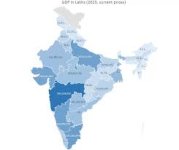State of the states in Indian Economy – Is any state leadership trying to create sustainable competitive advantage for its people?
By: Amit Bhushan Date: March 3rd, 2013 Contact: [email protected]
The state of the Indian economy is in doldrums. So is the state of most of the states. This is because the politicians at the state level compete to support ‘consumption’ of the masses. They rely on the center’s largesse for creating an attractive Industrial climate which is largely through concessions in ‘production taxes’ for a designated Industrial area. Earlier the states used to compete with each other basis the state taxes on ‘sales of goods’ which was used as bait to attract production units who were offered ‘concessions of lower tax rate’ to attract such units. However, this kind of competition led to depletion of state coffers to the benefit of the industrial unit owners who exploited the political weakness of the state leadership. With introduction of VAT which is uniformly applied across states, this gap is plugged and thankfully the state coffers now have revenues to fund the state level schemes.
However, the political direction is now to compete to offer ‘handouts’ to people. This has its benefit as it allows politicians to exploit the weakness of distribution system to manipulate this to his advantage. Some of the better and ‘real governing class’ politicians are able to utilize this system to ‘create projects’ using the state resources or even better using Public Private Partnership for production/procurement and distribution projects. Successful creation of such projects allows such politicians claim to fame as it gives them an exalted status to manipulate bureaucrats by giving them lectures about nurturing successful projects and generating revenues. The added experience of raising loans from domestic/multilateral agencies creates an aura like a ‘Gautam Buddha’ and catapults such politicians in a different league all together. Such endeavour help in such politicians gain the endorsement of the industry for ministerial berths especially of the economic ministries. Those who lack such experience find it difficult to sustain themselves in such ministries even if they enjoy public support.
Very few politicians at state have attempted to create a sustainable advantage for their people. Like we cannot say that the public education system (state owned school/colleges/board/universities or other education institutions) in any state (big or small) is definitely better than that in others. This is because almost all states whether ruled by the existing ruling party or the principal opposition party or any other regional or communist party have just concentrated on delivering centers scheme or copycat schemes. No state has a better education delivery system that would allow there people to compete in a better way for jobs offered by Center or by the private sector which goes to the best qualified.
Similarly, no state has invested to create a better industrial zone (like common environment control system, water recycling system, dedicated power system etc.) than other states to attract industry or a specific sector. The state leadership feels that since center doles out tax benefits for specific regions and also arbitrarily invests center’s money for creation of industrial clusters, so it is pointless to invest public resources in trying to compete with center. This has neglected support of those specific industrial clusters where the state can have competitive advantages basis availability of resources within the state. For example, iron ore and coal is available in Chattisgarh/Jharkhand/West Bengal but hardly any units for stainless steel.
The states have also not tried to seek a different direction from the others. Like no state has invested resources to either create a superior health care system or create a Powerful PPP model for development of health care. Instead the ratio of spends of states is largely same across board which depicts a lack creativity amongst state leaders. This is when the global experience with the rise of China clearly depicts that powerful states have invested to create a competitive advantage for their people. The state leaders have left the job entirely to the center.
Some of the most powerful state satraps unabashedly demand ‘First amongst equal status’ whereby they shamelessly argue to seek special central assistance like a Tax concession zone, some centrally funded projects or a special financial package to assist and supplement state revenues without putting in any manner, any type of qualification criteria. Such politicians know that the ‘relative advantage’ mode works much better for them as its allows them to show rapid industrialization/infrastructure beef up or allows them to launch freebies for their voters. Competing locally with other states as well as globally with other countries is much tougher and requires long term approach, a luxury they are nt sure if they have. Besides, trying to create a sustainable competitive advantage is even tougher and often seen as ephemeral goal since the global forces keep on changing their dynamics and such advantages are frequently lost. Besides such utopian values put a lot of pressure on the people and resources of the state and may not really result in any election advantages. There is therefore an urgent need to launch introspection amongst the youth to change to change the political course in the country.

